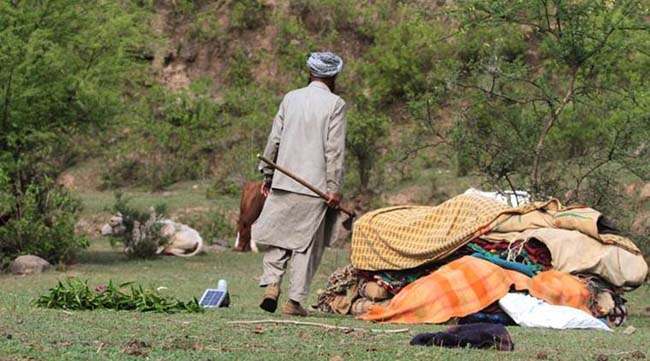Udhampur, April 14:
ON THE road just beyond Jawahar Tunnel, between Jammu and Kashmir, the Bakerwals have made a meadow their home for the night. It’s an annual ritual, this trek with grazing livestock from various districts in Jammu province to Kashmir and Ladakh. But this time, the journey is different. They are a month early, they are in a hurry. They stay close, they keep their children closer. Because, this time, close on their heels are memories of the gangrape and murder of an eight-year-old daughter of one of their own. “We felt we were a part of the population all these years. Now, we feel exposed,” says 21-year-old Ikhlaq, who walks the 300-km Jammu-Srinagar highway twice a year.
“We left as soon as the child was buried,” he says, adding that he has known the biological and adopted parents of the Kathua victim for most of his life.
Around 90 km away, up a dirt track in Udhampur, the victim’s biological father is busy attending to what’s left of his family. His wife is away, collecting firewood. Her eyes well up as she returns to where the horses were grazing. “My little girl liked horses,” she says. Her brother, the girl’s adopted father, had lost two children in a bus accident around the time she was born. “He cried and begged me to give him my girl. He said raising her would take some of the grief away,” she says.
After a year, she relented and gave her youngest child to her brother. They lived together for the six months spent in Kargil. During the winter, the two families moved in different directions — one to Samba and one to Kathua. “I can’t see anything here that does not remind me of her. Soon apples will be in season, she loved apples,” she says.
The mother says they were thinking of bringing the girl back home this year. “When she went missing, my brother thought she may have come to visit us. I have two boys and a 13-year-old girl but I barely look at them anymore, I am afraid of losing them… I could have found some peace had an animal attacked her but how can human beings bring themselves to do what they did to her?” she says.
Back in Banihal, Ikhlaq is herding 300 sheep and goat. His family of five, including two children, is making its way towards Qazigund in Kashmir.
Some members of the community who left Kathua and Samba early pulled their children out of school, not wishing to leave them behind in a communally charged atmosphere. “We would normally leave the children who were in school with elders or grandparents too old to walk all the way. This year, we are taking them with us,” says Muntaqib, who is part of the group. They are not surprised to know that the eight-year-old was alone in a meadow grazing her horses by herself, when she was abducted. “Our children grow up around animals and are not afraid,” says Muntaqib. Pointing to his five-year-old son, he says, “If I ask him to bring all our horses together from wherever they are grazing, he will.”
Bakerwals are one of 12 scheduled tribes in J&K with a population of just over 60,000. They steer their livestock — sheep, goat, cattle and horses — along the highway and sometimes along forest routes in the surrounding mountains. They stop where they can and make home under tents, walking over four months a year in search of grazing grounds.
“The police never bothered us, nor did the people in the towns and villages we passed through. Our only fear was wild animals but now we fear people,” says Jamila, who is steering her flock in Batote, 17 km from Srinagar.
“Fear has taken hold of us,” she says. Jamila adopted a four-year-old orphan on her last trip to Kargil. On Friday, the boy followed her, refusing to utter a word.
Away from politics and at a distance from the population, the Bakerwals choose to walk the distance of their annual migration for two main reasons.
“The cost of transporting the animals by truck is steep for a floating population with seasonal income. Also, if we do not walk the livestock through the plains, they will not be able to tread the mountains,” says Mohammad Shafiq, a Bakerwal in Udhampur who is on a 560-km journey to Kargil to sell livestock and wool.
However, some Bakerwal women say they want to settle down with their flock and family. “We are primarily tribal forest dwellers but people do not let us settle… the Hindu landlords in Jammu and the Buddhist landowners in Ladakh. With Kashmir, the problem is the situation,” says Jamila.
Courtesy: Indian Express




